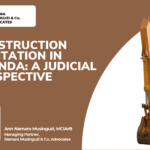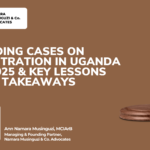Alternative Dispute Resolution (ADR) is a form of Dispute Resolution where parties resolve disputes without recourse to Court.
The most common forms of ADR include; negotiation, mediation, adjudication and arbitration. An ideal dispute resolution clause is Multi-tiered; with arbitration being a remedy of last resort.
Negotiation: Amicable resolution of disputes by parties mutually without the intervention of a third party.
Mediation: Resolution of disputes between parties as guided by a neutral third party known as a Mediator. To note that the decision of the Mediator is not binding.
Adjudication: A form of dispute resolution, peculiar to construction contracts, where parties submit their disputes to an individual or a tribunal(DAB/DAAB) which renders a decision within a contractually stipulated time. Adjudication is binding in the interim until a party dissatisfied with the decision proceeds to submit the same to Arbitration.
ARBITRATION
Arbitration is a mode of Alternative Dispute Resolution where two parties agree to submit their dispute to a neutral third party or Tribunal for determination. The decision of the Arbitrator is final and binding.
The notable international arbitration centers include the London Court of International Arbitration (LCIA), the International Centre for Settlement of Investment Disputes (ICSID) under the auspices of the World Bank), the International Chamber of Commerce (ICC), the Singapore International Arbitration Centre (SIAC) and Hong Kong International Arbitration Centre (HKIAC). In Uganda the arbitration centers are Center For Arbitration and Dispute Resolution(CADER) and International Center for Arbitration and Mediation in Kampala(ICAMEK).
In Uganda, the governing law is the Arbitration and Conciliation Act Cap 5 which mirrored the UNCITRAL Model Law on International Commercial Arbitration 1994.
The Arbitration and Conciliation Act, Cap 5 (Laws of Uganda 2024) domesticated the New York Convention on the Recognition and Enforcement of Foreign Arbitral Awards, 1958 (“New York Convention”). It also domesticated the Convention on the Settlement of Investment Disputes Between States and Nationals of Other States 1966 (“ICSID Convention”). Having ratified and subsequently domesticated both Conventions, Uganda is thus obliged to enforce Awards presented to its courts for enforcement by States that have adopted both conventions, in accordance with the relevant terms of the respective conventions.
KEY TENETS OF ARBITRATION:
01: Separability
It means that an arbitration clause is an “agreement within an agreement” and its validity is not affected by the illegality or voidness of the main contract (Section 16 of the Arbitration & Conciliation Act Cap 5, Afri-Power Engineering Company Limited V Roko Construction Limited HCCS No. 216 of 2022, Lakeside Dairy Limited V International Centre For Arbitration and Mediation in Kampala & Anor: Misc. Cause No. 0021/2024 arising out of Arb. Cause No. 0004 of 2021).
“Arbitration without privity” is a doctrine whose roots are founded in separability of an arbitration clause (Plinth Consultancy Services Ltd v. Inyatsi Construction Ltd, Inyatsi Group Holdings (Pty) Ltd & Absa Bank (U) Ltd, Misc. Cause No. 0053/2024).
02: Non Court Intervention
Premised on Party Autonomy.
Court Intervention is limited to matters provided by law (Section 9 of the Arbitration & Conciliation Act Cap 5). These include; issuing interim measures of protection, hearing applications for setting aside & enforcement of Awards respectively.
The Supreme Court of Uganda reinforced this position in Mohammed Mohammed Hamid v Roko Construction Ltd SCCA No. 014 of 2015 & Babcon Uganda Limited V Mbale Resort Hotel Ltd SCCA No. 06 of 2016.
Recently, the Court of Appeal reiterated his principle in Simba Properties Investment Co. Ltd & 5 Ors. V Vantage Mezzanine Fund 11 Partnership & Anr Civil Applic. No. 231 of 2025.
03: Finality
ADR by its nature is preferred because it leads to quick resolution of disputes. It therefore follows that there is not much leeway granted in an Appellate process as is the case in Litigation.
Limited grounds for setting aside an Award under the Arbitration & Conciliation Act Cap 5 (Section 34).
Uganda is a signatory to the Convention on the Recognition & Enforcement of Foreign Arbitral Awards; 1958 (“New York Convention”) and hence it is bound by the grounds for refusal to enforce an Award as provided for under Article 5 of the Convention.
Appeals under the Arbitration and Conciliation Act Cap 5 are limited to only matters of law and only if the parties agree that an appeal lies (Section 38).
04: Party Autonomy
Parties are free to agree on everything including; the procedure of appointing the arbitrator, the number of arbitrators, the procedure for challenging an arbitrator, the rules governing the arbitration, the venue of arbitration, the seat of arbitration. The only exception is the Arbitral Award (Save for a Consent Award).
05: Impartiality
The Arbitral Tribunal must not only be impartial but must be perceived to be impartial throughout the conduct of the entire Arbitration Process.
Any partiality must always be declared as soon as it arises. The IBA “Traffic Lights” (IBA Guidelines on Conflicts of Interest in International Arbitration 2024) are a good guide.
KEY FEATURES OF AN ARBITRATION AGREEMENT
Should be in writing. This incudes a signed document, exchange of letters, a telegram or other means of telecommunication which provide a record of the agreement.
The written consent of both parties to submit their dispute to arbitration is the cornerstone of arbitration. Consent though does not require action by a counterparty to be fully operative. Consent is given in one of two ways; the most obvious way is a consent clause in a written agreement between the parties, but also it may be by means of a written unilateral communication to the other party. The requirement that an arbitration agreement be in writing is regarded as satisfied if the content of the arbitration agreement is recorded in any written form by one or more of the parties to it, or by a third party with the authority of the parties to the agreement. The key factor is that the parties’ consent must be mutual, clear and unequivocal or unambiguous; a common subjective intent to submit disputes relating to the Contract to arbitration. (Hon. Justice Stephen Mubiru in the case of TMA Architects & Anr V Prome Consultants Limited Misc. Cause No. 0080/2021).
Scope of disputes that can be referred to arbitration;
The governing law of the arbitration agreement;
The seat of arbitration (lex arbitri); – the law of the seat governs the juridical proceedings of the arbitration including the court to which applications for setting aside are brought (Great Lakes Energy Company NV V XSABO Power Ltd & 4 Ors ARBITRATION CAUSES No. 0002 and 0005 OF 2023 (consolidated)(Arising from London Court of International Arbitration (LCIA) Consolidated Arbitration 5 No. 204602 of 2021));
The venue of arbitration (S. 20 of the Arbitration Act Cap 5);
The rules governing the arbitration;
The number of arbitrators and their method of selection; The institution governing proceedings or confirmation of ad hoc arbitration;
In the event that the arbitration agreement is silent on any aspect, the parties are free to agree on the same; failure of which the Arbitrator, Appointing Authority or Court will direct.
Effect of bare arbitration clause? Remains binding as long as there is intent by the parties to submit the matter to arbitration (Lakeside Dairy Limited V International Centre For Arbitration and Mediation Kampala & Anr Misc. Cause No. 0021/2021 (Arising from Arbitration Cause No. 0004 of 2021)).
Pathological clause? Pathological arbitration clauses are ones with apparent defects liable to disrupt the smooth progress of the arbitration, for example where the clause is so ambiguous as to be meaningless such that there is no effective arbitration agreement (Lovelock Limited v. Exportles [1968] 1 Lloyd’s Rep 163; wherein two modes of dispute resolution were provided for).
CONDUCTING OF THE ARBITRATION
Fundamental Principle: Parties to be treated with equality; with each party being given reasonable opportunity to present their case (S. 18 of the Arbitration & Conciliation Act Cap 5).
Fundamental Principle: All communication between the Arbitral Tribunal & the parties to the Arbitration must always be reduced into a Procedural Order.
Parties are required to file statements supporting their Claim/Defense as well as documents.
RedFern Schedule: A guide to discovery and disclosure of documents.
IBA Rules on the Taking of Evidence in International Arbitration 2020 – Soft Law on best practices on the taking of evidence.
Parties are at liberty to agree on whether they intend to call witnesses (And how the witnesses shall give their evidence) or whether they shall proceed by documents only and whether experts are necessary.
At the closure of the arbitration, the parties are required to file their respective submissions and a final Award is rendered. The timeline for rendering the Award is dependent on the Seat of the Arbitration.
A Final Award is rendered at the end of the arbitration process. It should be differentiated from an Interim Award that determines interim issues for example; in cases where the Arbitrator rules on their jurisdiction. Both types of Awards are in writing and are premised on both parties’ cases, guided by the issues as framed and the documents & all evidence as presented.
The Law of the Seat provides for a timeline within which the Arbitral Tribunal may correct/interpret an Award. In instances where the law of the seat is Uganda, the timeline within which an application for correction may be made is 14 days from the date of delivery of the Award. The timeline within which the Arbitral Tribunal may on its own motion correct/interpret an Award is 30 days from the date of delivery of the Award (S. 33 of the Arbitration & Conciliation Act Cap 5).
An additional Award may be requested by the parties within thirty days after receipt of the Award (S.33 of the Arbitration & Conciliation Act Cap 5).
SETTING ASIDE & ENFORCEMENT OF AN AWARD
The Law of the Seat governs applications for setting aside an Arbitration Award; including timelines for conducting the same. The grounds for setting aside under S. 34 of the Arbitration & Conciliation Act Cap 5 include bias, the Award being contrary to Public Policy.
Appeals are limited to situations where the parties have agreed and only on a point of law (S. 38 of the Arbitration & Conciliation Act Cap 5).
The Arbitration & Conciliation Act provides for filing of an application within one month from the date of delivering the Award. To note that the one month starts to run from the date of delivery of the Award as opposed to the date of receipt of the Award (Fountain Publishers V Harriet Nantamu & Anr HCMA 135/2011 Arising from High Court Arbitration Cause No. 01 of 2011).
To further note that there are two conflicting decisions on what amounts to one month with a decision equating one month to 30 days (Fountain Publishers) and another calculating one month as 31 days as a means of resolving the non clarity arising from the interpretation of “month” in the Interpretation Act Cap 2 (Parsha International Ltd T/a Champion Bet/Slots V Homebet Limited Misc. Civil Applic. No. 0598 of 2021 arising from Arbitration Cause No. 0003 of 2021).
In the event that the Award is not set aside or no application is made for setting aside, the same is then Enforced in accordance with the law of the Country to which it is presented for recognition and Enforcement.
In Uganda, an Award is enforced as though it were a decree of the Court (S.36 of the Arbitration & Conciliation Act Cap 5).



